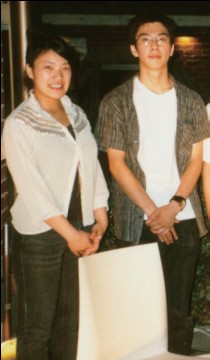
The American Field Service (AFS) is a private, nonprofit international education exchange organization that aims to create a peaceful society. It mainly consists of exchanges by high school students who plan to study abroad. In 1946, hoping for world peace, the American Field Service performed an international exchange which triggered the beginning of AFS. An administrative office in New York was formed with more than fifty joint countries actively performing in the area. The Kyoto branch office centralizes students and with the help and support of the working members of society, we aim for intercultural exchanges and mutual understanding. We support foreign students day by day and have expanded various activities.
Since this is intended for high school students, the university refused to give permission to perform activities at school. However, we ended up getting approved in the fall of 2007, and can now actively perform publicity work at school. Making use of our overseas experience during high school, there are about fifteen students who are active under the Kyoto branch office. Although not very visible, we are steadily performing international exchange activity.
I, chairman of the Kyoto branch in 2007, who stayed in Malaysia at AFS will introduce the following data. Spisophon Posurot, an international exchange student in 2007 from Thammasat University, has been to Japan through Thai AFS during her high school career. The staff was also able to deepen international exchange with students from Asia at the AFS Kyoto branch office Christmas party in December 2007. The former Secretary General of the Cabinet,Shiozaki and his wife are graduates of AFS and many AFS experienced members have played an active role in Japan
◯Estimated number of members of AFS who have graduated from Doshisha University in the past 5 years: 15| Doshisha High School | Kori High School | International High School | |
| 2002 | 1(Vietnam) | 1(Sweden) | |
| 2003 | 1(Switzerland) | 2004 | 1(Germany) | 1(Venezuela) |
| 2005 | 1(France) | 1(Thailand) | |
| 2006 | 1(Thailand) | 1(Argentina) | |
| 2007 | 1(Korea) | 1(United States) |
| Doshisha High School |
Kori High School |
International High School |
Girls’ High School | |
| 2000 | 1 | 1 | 1 | |
| 2001 | 4 1 | 1 | 2 | |
| 2002 | 3 2 | 1 | ||
| 2003 | 1 1 | 1 | 1 | |
| 2004 | 3 3 | 1 1 | 1 | |
| 2005 | 4 | 1 | 1 | |
| 2006 | 1 1 | 2 | ||
| 2007 | 2 3 | 2 | 1 | 1 2 |
| 2008 | 4 | 2 |
Conditions of international exchange at high schools-the Ministry of Education,research 2006 (“Ministry of Education 2006 study:published on December 27,2007, Issue 97) are as follows
We (AFS Doshisha volunteers) actively work by dividing into two campuses: the Kyotanabe and Imadegewa campus. We perform intercultural understanding around the campus area, and have meetings to see if we can offer mutual understanding. We also prepare plans and manage them. We often help international exchange students who come to Kyoto by finding them host families. To help them find a host family, we instruct the students on how to visit them, and we also put up posters with notices and information around the area. We believe the easiest way to experience intercultural understanding is to actually become part of a family. Intercultural understanding is not only possible with host families but also with the entire community.
Beyond that, we also support international students and host families. We make sure the host schools are capable of overseeing their life smoothly. I think having more opportunities to interact with society is a good experience for us. With all the people who made full use of this experience, I believe we should too even after we graduate from Doshisha.
I would like to introduce one enthusiastic member, Taguchi’s experience (2008 Policy Studies Graduate, positioned at a foreign-affiliated firm).

“In my second year, I was in charge of finding homes who accepted international students, also known as ‘Family Finding’. I made phone calls in between classes, visited homes after school, and explained the support systems and program contents. Basically, my life revolved around AFS. I think I learned a lot from these experiences.”
“One thing I learned is to always think from others’ points of view. For example, things wouldn't go well for host families if we only conveyed our enthusiasm. We have to put ourselves in their shoes and think about the possible negative situations that could come up. Then we must talk through and understand them. I’ve learned to think from the point of view of international students, host families, and staff. I want to have some sort of connection with Southeast Asia even after I graduate. One day I would like to host a student myself, and welcome and support international students.”
*Taguchi's articles were partly reproduced from "One purpose" My Purpose (No. 151: June 2007),Doshisha magazine publication*The articles were reproduced and modified by the “Doshisha University Staff English Club News “Topics” No3. (dated on May 31,2007)